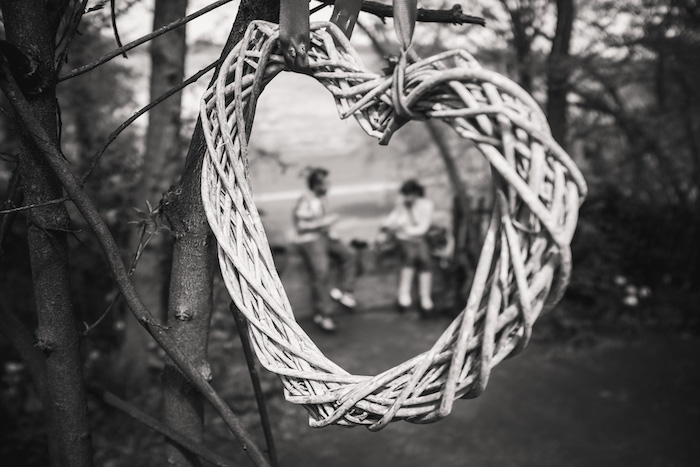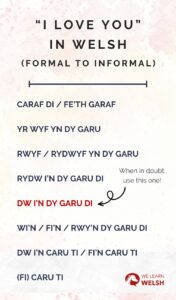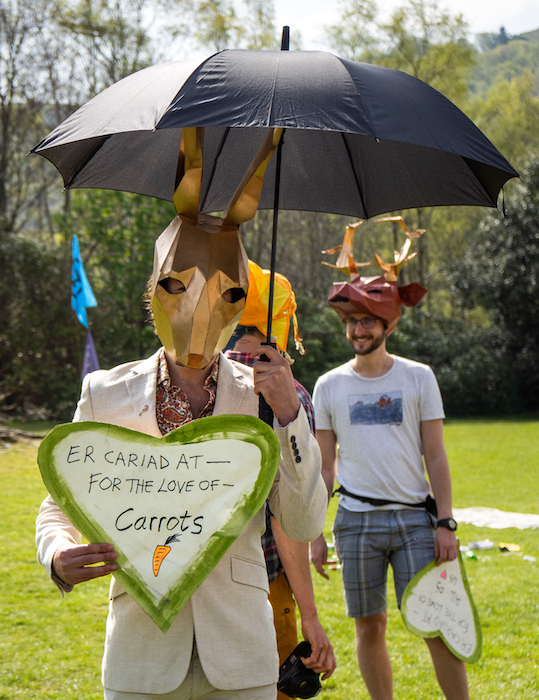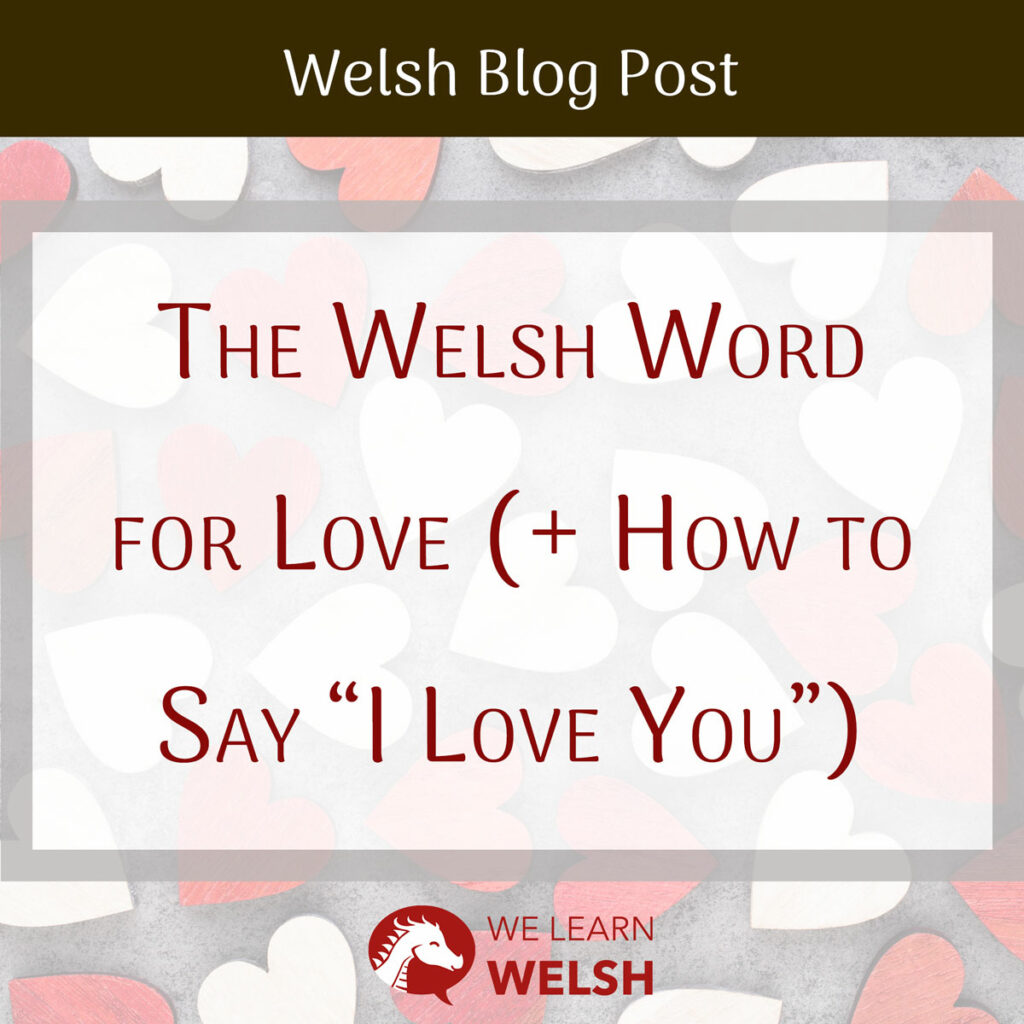If you’ve been searching for Welsh love words and expressions, you probably want to say one of four things:
- I love you
- in love
- to love something (non-romantic)
- love (a term of endearment for someone you care about)
How to Say ‘I Love You’ in Welsh
Let’s talk about “I love you” first since this is probably what most of you romantics are interested in saying!
The modern standard way of saying “I love you” in Welsh is:
Dw i’n dy garu di.
I love you.

This is the form you’ll come across in Welsh textbooks but depending on where you live and who you speak to, you might come across some dialectal variation in how people say this phrase. Some of the most common examples are:
- Wi’n dy garu di.
- Fi’n dy garu di.
- Rwy’n dy garu di.
To give the phrase an even more colloquial feel, many speakers drop the ‘dy’ before ‘caru’ altogether and create forms such as:
- Dw i’n caru ti.
- Fi’n caru ti.
- Wi’n caru ti.
- Dw i’n caru chdi.
- Fi caru ti.
- Caru ti.
But what if you want to speak in a more formal register? In that case, you can generally use one of two expressions:
- Rydw i’n dy garu di. (less formal, used in writing and speech)
- Rwyf / Rydwyf yn dy garu. (more formal, used in writing)
And if you want to take it a step further and transform your sentence into literary Welsh, you can write:
- Yr wyf yn dy garu.
- Caraf di. (in poems and songs)
- Fe’th garaf. (often used in religious songs)

Whew, are you sweating yet? No? Then let’s move on to the second point!
P.S. For a great summary of all these expressions, be sure to check out the following video by Ze Point of Ze Day and subscribe to his channel!
‘In Love’ in Welsh

Unlike “I love you” which can be expressed in numerous ways, I’m happy to share that there is only one way of saying “in love” in Welsh: mewn cariad. In fact, cariad on its own is the Welsh noun that means love.
- Dw i mewn cariad. – I’m in love.
Mewn cariad is also used in the expression “to fall in love,” although which word you use for “fall” will depend on where you live in Wales.
- syrthio / cwympo / disgyn mewn cariad – to fall in love
To Love Something (in a non-romantic way)

In English, we use the verb “to love” to express our affection for a wide variety of things, from people to the physical objects and activities we enjoy. Not so in Welsh!
If you want to say that you love a thing or activity, you’d best become familiar with the following expressions:
1) Dw i wrth fy modd… – I love… / I really enjoy…
This first phrase can be used with a) efo / gyda for nouns and pronouns or b) yn for verbs. For example:
- Dw i wrth fy modd gyda / efo’r car. – I love the car.
- Dw i wrth fy modd yn gyrru’r car. – I love driving the car.
Note that the grammar will change in accordance with the subject:
- Wyt ti wrth dy fodd…
- Mae o/e wrth ei fodd…
- Mae hi wrth ei bodd…
- Dan ni wrth ein boddau…
- Dach chi wrth eich boddau…
- Maen nhw wrth eu boddau…
2) Dw i’n lyfio… – I love…
This second, very colloquial expression comes from the English “love” and is mostly used in North Wales by the younger generation for any kind of non-sexual love. This means it can be used for people in a platonic sense as well.
- Dw i’n lyfio’r car. – I love the car.
- Dw i’n lyfio’r ffilm ‘ma. – I love this film.
- Dw i’n lyfio chdi. – I love you. (platonic)
Dw i’n lyfio bwyta siocled.
I love eating chocolate.
A word of warning: many Welsh speakers thoroughly dislike this expression because it is considered an “incorrect” calque (loan translation) from English. You certainly won’t find it the dictionary … but that doesn’t mean that it won’t become standard one day!
3) Rwy’n dwli ar… / Dw i wedi gwirioni… – I love… / I’m crazy about…
Another expression that is used very often in South Wales is dwli ar whereas in the North, you’ll be more likely to hear wedi gwirioni efo / ar / â. Both can be loosely translated as “go mad for” or “be crazy about.”
- Rwy’n dwli ar eich llyfr newydd. – I love your new book.
- Rwy’n dwli ar fynd i weld ffilmiau. – I love going to see films.
- Dw i wedi gwirioni efo plant. – I love children.
- Dw i wedi gwirioni ar y lle. – I love the place.
Rwy’n dwli ar blant.
I love children.
4) A final “safe” option is to stick with the well-known words hoffi and licio, both of which mean “to like” in English but can substitute “to love” in most cases.
- Dw i’n licio / hoffi coffi. – I like/love coffee.
- Dw i’n licio / hoffi mynd i’r sinema. – I like/love going to the cinema.
Hello, love!
In British English, “love” is frequently used as a term of endearment for someone you care about, such as a spouse, child, or close relative.
In Welsh, there are a few equivalents you might want to give a go!
- cariad – love
- cyw – chick
- del – pretty
- fy ngwas i – my boy
- fy mach i – my little one
- pwt – small thing, bit, scrap

